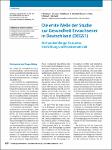Die erste Welle der Studie zur Gesundheit Erwachsener in Deutschland (DEGS1)
Stichprobendesign, Response, Gewichtung und Repräsentativität
Kamtsiuris, Panagiotis
Lange, Michael
Hoffmann, Robert
Rosario, Angelika Schaffrath
Dahm, Stefan
Kuhnert, Ronny
Kurth, Bärbel-Maria
Die „Studie zur Gesundheit Erwachsener in Deutschland“ (DEGS) ist Bestandteil des Gesundheitsmonitorings des Robert Koch-Instituts (RKI) und als kombinierte Quer- und Längsschnitterhebung konzipiert. Die erste Erhebungswelle (DEGS1; 2008–2011) umfasste Befragungen und Untersuchungen. Zielpopulation waren die in Deutschland lebenden Erwachsenen bis zum Alter von 79 Jahren. Das Mischdesign der Studie umfasste eine neue Einwohnermeldeamtsstichprobe, die durch Teilnehmende des Bundes-Gesundheitssurveys 1998 (BGS98) ergänzt wurde. Insgesamt nahmen 8152 Personen teil, darunter 4193 Ersteingeladene (Response 42%) und 3959 Wiedereingeladene (Response 62%). 7238 Personen besuchten eines der 180 Untersuchungszentren, 914 wurden ausschließlich telefonisch/schriftlich befragt. Der Vergleich verschiedener Merkmale zwischen der Nettostichprobe, der Gruppe der Nichtteilnehmer und der Bevölkerung Deutschlands weist auf eine hohe Repräsentativität hin. Gewichtungsfaktoren wurden berechnet, um Querschnitt-, Trend- und Längsschnittanalysen hinsichtlich einzelner Merkmale der Bevölkerungsstruktur zu korrigieren. Ferner wird bei den ehemaligen BGS98-Teilnehmenden die unterschiedliche Wiederteilnahmebereitschaft ausgeglichen. The “German Health Interview and Examination Survey for Adults” (DEGS) is part of the health monitoring system of the Robert Koch Institute (RKI) and is designed as a combined cross-sectional and longitudinal survey. The first wave (DEGS1; 2008–2011) comprised interviews and physical examinations. The target population comprised 18- to 79-year-olds living in Germany. The mixed design consisted of a new sample randomly chosen from local population registries that was supplemented by participants from the “German National Health Interview and Examination Survey 1998” (GNHIES98). In total, 8,152 persons took part, among them 4,193 newly invited participants (response 42%) and 3,959 who had previously taken part in GNHIES98 (response 62%). In all, 7,238 participants visited one of the 180 local study centres, and 914 took part in the interview-only programme. A comparison of the net sample with the group of non-participants and with the resident population of Germany suggests a high representativeness regarding various attributes. To account for certain aspects of the population structure, cross-sectional, trend and longitudinal analyses were corrected by weighting factors. Furthermore, different participation probabilities of the former participants of GNHIES98 were compensated for. An English full-text version of this article is available at SpringerLink as supplemental.
No license information

